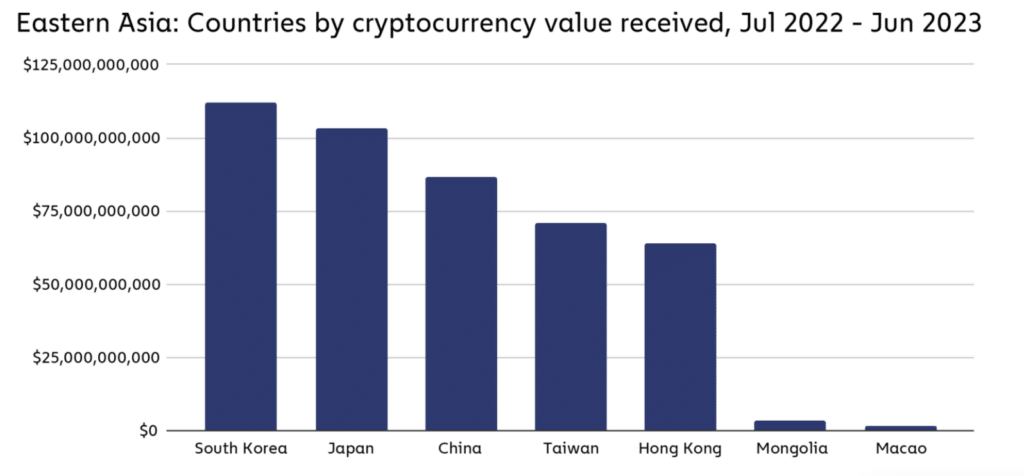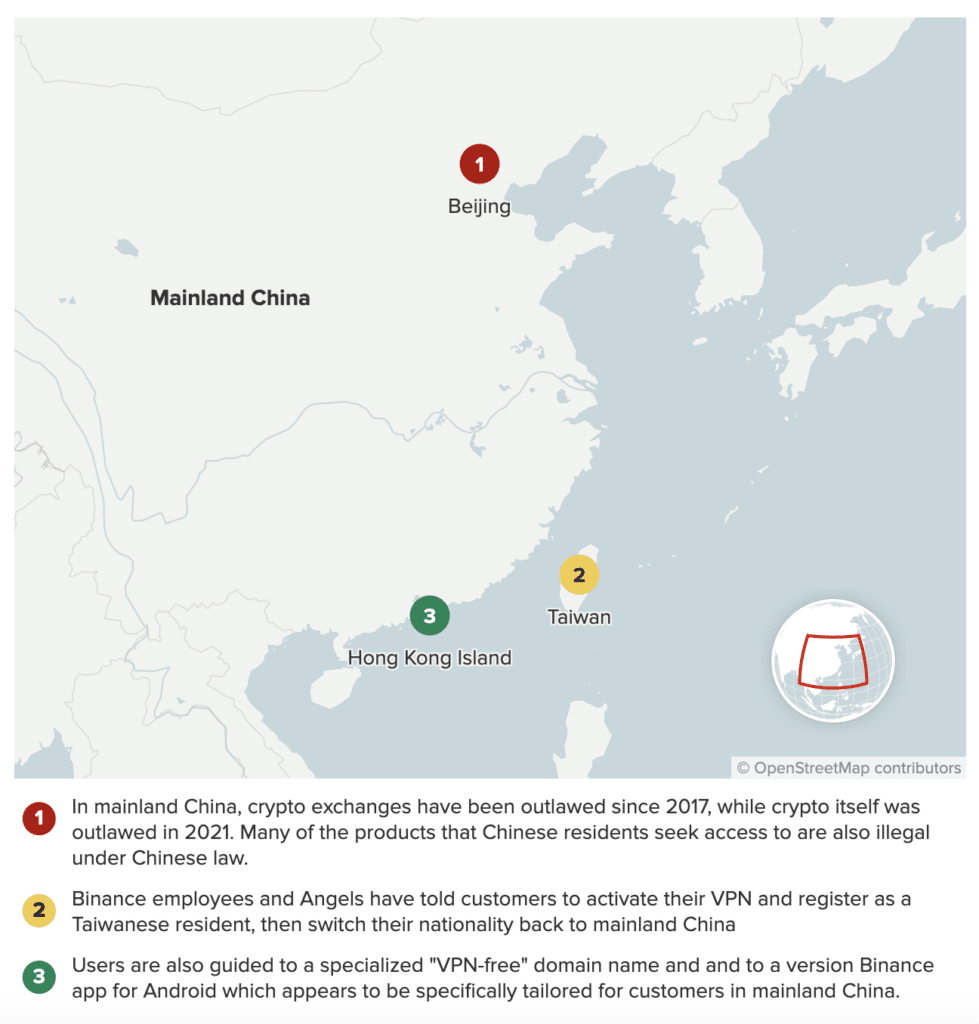Chinese traders prosper despite crypto ban. Here is how they evade it
Chinese crypto traders thrive despite the country’s strict measures against mining and digital currency transactions.
In 2020, China was an active player in the cryptocurrency market, accounting for more than 75% of the global Bitcoin (BTC) mining hashrate. That all changed after the government cracked down on all cryptocurrencies. Recently, though, regulations seem to be slightly relaxed as investors seek promising new assets.
Chinese Bitcoin traders remain a significant force in Bitcoin trading. Their participation in the latest cryptocurrency sell-off is motivated by market price fluctuations rather than new constraints imposed by Chinese regulators.
Chinese trade for billions of dollars despite the ban
According to Chainalysis, between July 2022 and June 2023, the Chinese cryptocurrency market processed $86.4 billion in crypto transaction volume. Large retail transactions ranging from $10,000 to $1 million make up 3.6% of the total, nearly double the global average. Source: Chainalysis
Source: Chainalysis
Chainalysis experts say that recent events in Hong Kong have fueled speculation that the Chinese government may be warming up to cryptocurrencies and that Hong Kong could become a testing ground for these efforts.
How to bypass restrictions
Despite a ban on cryptocurrency trading in China since 2021, Reuters reports that losses in the Chinese stock market over the last three years have driven investors back to cryptocurrencies. Dylan Run, a financial executive in Shanghai, refers to Bitcoin as “a safe haven, like gold.”
In early 2023, noticing the downturn in China’s economy and stock market, Run started shifting some of his funds into cryptocurrencies.
Though officially banned, cryptocurrency trading remains accessible in China. Citizens continue to trade digital tokens like Bitcoin on platforms such as OKX and Binance or through over-the-counter methods. Another option is using foreign bank accounts to buy cryptocurrencies.
You might also like:
China to introduce significant changes to crypto AML for the first time in 17 years
Variety of payment methods
With China’s cryptocurrency ban, investors have become more creative in managing their funds. As Reuters reports, Dylan Run, for instance, used bank cards from small rural banks to purchase cryptocurrencies through unofficial dealers. He kept transactions under 50,000 yuan ($6,978) to avoid drawing attention from authorities.
Traders have found various ways to transfer cryptocurrencies, including cash or bank transfers. Cities like Chengdu and Yunnan have become hubs for these traders, offering a respite from the central government’s scrutiny, which is focused elsewhere.
According to the Wall Street Journal, Chinese investors also turn to social networks like WeChat and Telegram for cryptocurrency trading. They use these platforms to connect with others in specialized groups, bypassing the need for centralized exchanges.
In rural areas, where enforcement is less strict, the physical trading of digital assets is prevalent. Traders often meet in public places such as cafes or laundromats to exchange wallet addresses or conduct transactions in cash or through banks.
You might also like:
China experiencing increased crypto-related corruption, bribery cases
Hong Kong
Hong Kong also offers savings opportunities as Chinese citizens are given an annual foreign currency purchase of $50,000, which some use to buy cryptocurrencies in the Hong Kong market.
As China’s $135.7 trillion real estate market continues to struggle, more citizens may soon turn to cryptocurrencies to catch up. The country’s property market ended 2023 with the steepest fall in new home prices in nearly nine years, despite government efforts to prop up a sector once a critical driver of the world’s second-largest economy.
One anonymous Hong Kong crypto exchange executive told Reuters they see mainland investors entering the cryptocurrency market almost daily. China’s economic downturn “has made investment on the mainland risky, uncertain and disappointing, so people are looking to allocate assets offshore.”
And it’s not just retail investors. Chinese brokers and other financial institutions have also begun to enter the cryptocurrency market. The need for growth opportunities on the mainland has pushed them to explore the cryptocurrency business in Hong Kong.
“If you’re a Chinese broker facing a weak stock market, weak IPO demand, and shrinking other businesses, you need a growth story to tell your shareholders and board of directors.”
Anonymous Hong Kong crypto exchange executive
Fintech platforms such as Ant Group’s Alipay and Tencent’s WeChat Pay have also made it easier for citizens to invest in cryptocurrencies. They allow users to convert yuan into stable digital coins at dealers, which can then be used to trade cryptocurrencies on various exchanges.
According to Chainalysis, the increasingly closer relationship between China and Hong Kong has some speculating that Hong Kong’s growing status as a crypto hub could signal that the Chinese government is changing course on digital assets or at least becoming more open to crypto initiatives.
False geolocation
Some users saved their accounts on trading platforms and continued to use them after the ban, bypassing geo-restrictions using a VPN. In May 2023 alone, the turnover of Chinese traders on Binance reached $90 billion – approximately 20% of the total. According to CNBC, exchange employees advised users from China to evade KYC checks. Source: CNBC
Source: CNBC
Last year’s report highlighted that some traders opened crypto accounts with fake documents, including citizenship.
By providing false residence and bank details, these traders seek to circumvent Know Your Customer (KYC) protocols and register accounts violating regulatory measures. This unconventional approach to cryptocurrency trading starkly contrasts the country’s strict regulatory environment.
China is looking for salvation in crypto
The surge in Bitcoin and other cryptocurrencies comes from underperforming traditional Chinese investments. The crackdown on the real estate sector and the ongoing economic transition have made conventional investment avenues such as stocks and real estate less attractive. Indeed, a dominant state-owned enterprise sector, opaque governance, regulatory uncertainty, and a weak credit rating system pose significant economic challenges.
Current conditions have accelerated the stock market crash and raised concerns about the future of China’s economic environment. Cryptocurrencies are, therefore, emerging as a viable alternative, offering a semblance of stability and growth potential amid the turbulence of the Chinese economy. Chinese traders’ rise in cryptocurrency investment is a telling sign of the times, reflecting a strategic shift in response to a changing economic and regulatory environment.
You might also like:
China’s crypto investors triumph despite restrictions, net about $1.2b
Follow Us on Google News
READ MORE ABOUT
ban
bitcoin
china
vpn
Norway regulators clamp down on crypto mining via new law
 By Rony Roy
By Rony Roy
April 17, 2024 at 10:18 am Edited by Dorian Batycka
Edited by Dorian Batycka
NEWS
Collect the article
share
Regulators in Norway are looking to clamp down on cryptocurrency mining via a new law for data centers operating in the nation.
According to a report from local media VG, the new framework will mandate that data centers register officially and provide information about those involved, like owners and leaders, and the type of services they offer. The legislation will be the first of its kind, making Norway the first European nation to regulate the data center industry.
“The purpose is to regulate the industry in such a way that we can close the door on the projects we do not want,” said Digitalization Minister Karianne Tung.
The new legislation is designed to enhance local government officials’ oversight of data centers, enabling them to make more informed decisions about approving or rejecting their operations. Regulators believe that this law will significantly improve the management of local data infrastructure.
Further, the regulators also clarified that they aren’t in favor of crypto-mining operations. Minister for Energy Terje Aasland expressed concerns regarding the greenhouse gas emissions associated with the cryptocurrency mining process.
“It is associated with large greenhouse-gas emissions and is an example of a type of business we do not want in Norway,” Aasland said, adding that they are not interested in businesses that are looking to extract cheap electricity.
You might also like:
Norway’s central bank advances CBDC pilot to new phase, unveils deadline
Norway is Europe’s largest hydropower producer, with renewable energy sources accounting for the majority of the country’s electricity. As such, the nation has become a budding hub for cryptocurrency miners in recent years due to the low electricity costs in the region. Per a 2023 report, mining firms in Northern Norway, where electricity is the cheapest, cumulatively used as much electricity as the district of Lofoten.
At the moment, the number of Bitcoin mining firms operating within the nation is unknown to the regulators. However, the new law will offer more clarity on the matter and help carry out Norway’s border digitalization plans, according to Tung.
The increased scrutiny from Norway comes as the broader crypto-mining economy has seen dwindling performance. Stocks of some major Bitcoin mining firms, like Marathon Digital Holdings and Riot Platforms, have continued to drop over the past few weeks.
The developments come as the crypto industry is set to witness the fourth Bitcoin halving this week. According to 10x Research Head Markus Thielen, Bitcoin miners could liquidate $5 billion worth of the flagship asset to remain profitable post-halving.
Read more:
Bitcoin mining: record-breaking in 2023, facing challenges in 2024














































